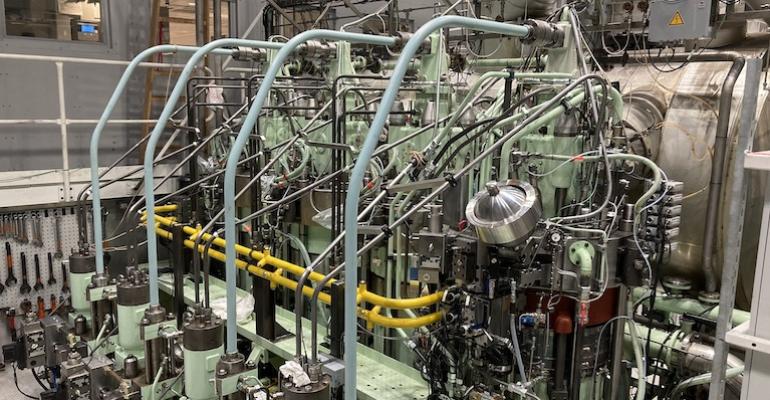As ammonia as a marine fuel starts to gain momentum with the first seabourne trials and engine orders there are growing concerns from environmentalists about N2O and NH3 emissions.
In an open letter to marine engine manufacturers 20 environmental pressure groups are calling for transparency on N20 and NH3 emissions from ammonia engines, noting that N2O is a 273 times more potent greenhouse gas than CO2 and NH3 emissions contribute to air pollution and indirect N20 emissions.
"Complete and transparent information on emissions from ammonia-powered engines is critical to accounting for the full lifecycle emissions of ammonia – from its production to its end-use – and understanding its true climate impacts as a shipping fuel,” said Natacha Stamatiou Senior Analyst, Global Shipping at Environmental Defense Fund, one of the signatories of the letter.
“Without this data, assessing the potential environmental implications of the fuel’s use will be largely based on assumptions which can limit the reliability of results."
The letter requests preliminary N2O andNH3 emissions data from laboratory tests from ammonia engines, including dual fuel, across a wide range of load factors from 5% to 90%.
“We are aware of the sensitivities associated with new technologies under development, and we stand ready to work with manufacturers to help collect this data in an independent, secure, and credible fashion,” the letter read.
“The climate crisis does not wait so we must hurry up with solutions. We have to make sure to take the right steps to protect the climate and the environment,” said Sönke Diesener, Transport Policy Officer at The Nature and Biodiversity Conservation Union, another of the 20 signatories to the letter.
“It’s of outmost importance to have guaranteed transparency on the possible downsides to make sure we find the right technical solution and create a regulatory framework that minimises the risks.”
The open letter coincided with an announcement by MAN Energy Solutions that Imabari Shipbuilding will install an MAN B&W 7S60ME-Ammonia engine on a 200,000 dwt bulk carrier newbuilding for for a joint venture between K Line, NS United and Itochu Corporation.
Brian Østergaard Sørensen, Vice President and Head of Research & Development, Two-Stroke at MAN Energy Solutions, said: “This project marks another important milestone in our ammonia-engine development and indeed for the maritime industry in general. It also confirms that we are on the right track in relation to our dual-fuel ammonia concept where we have gained a great understanding of ammonia’s unique characteristics as a marine fuel via our two-stroke engine testing, which we started in early June 2023.”
MAN has developed the engine since 2019 with over 100,000 man-hours recorded in that time.
Meanwhile the first trials of operating an ammonia engine onboard a vessel have been taking place in Singapore recently.
In trials overseen by the Maritime & Port Authority of Singapore (MPA) have taken place on the converted offshore vessel Fortescue Green Pioneer that has been retrofitted with an ammonia engine.
Signatories to open letter
Transport & Environment, Solutions for Our Climate, Opportunity Green, Stand.Earth, High Ambition Climate Collective, Pacific Environment, Ocean Conservancy, Environmental Defense Fund, Friends of the Earth- United States ,NABU (The Nature And Biodiversity Conservation Union), Oceans North, Surfrider Foundation Europe, University of California-Berkeley Goldman School of Public Policy, Zero Emission Ship Technology Association, Zero- Associação Sistema Terrestre Sustentável, Green Transition Denmark, Zero Emission Resource Organisation, Green Global Future, Seas at Risk, Royal Belgian Institute of Natural Sciences
Copyright © 2024. All rights reserved. Seatrade, a trading name of Informa Markets (UK) Limited.
Add Seatrade Maritime News to your Google News feed.  |

